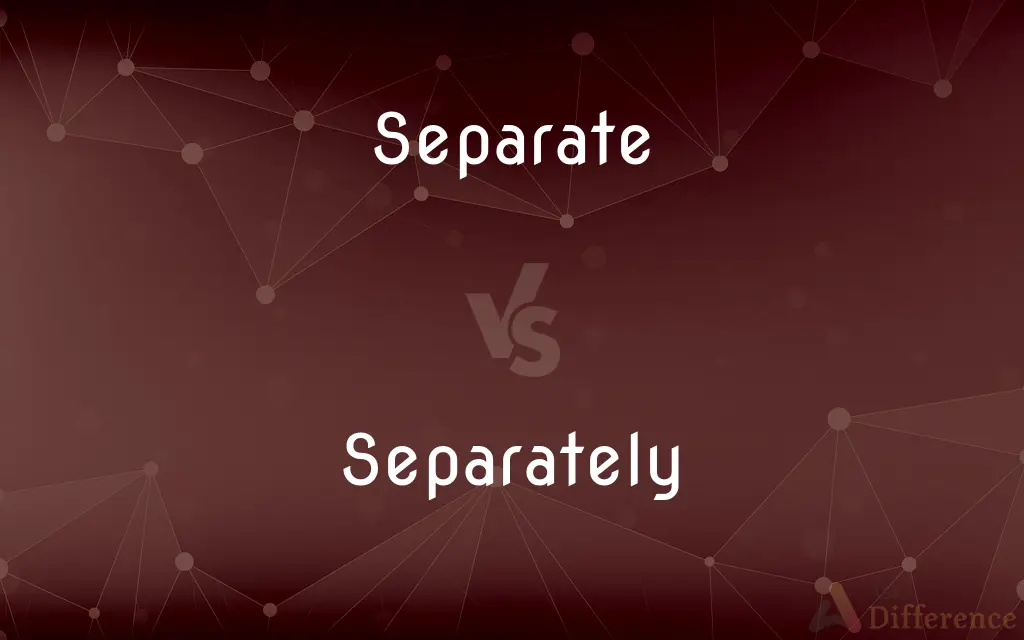Separate vs. Separately — What's the Difference?
Edited by Tayyaba Rehman — By Fiza Rafique — Updated on March 17, 2024
Separate emphasizes the action or state of being apart, while separately refers to doing something in a distinct, individual manner.

Difference Between Separate and Separately
Table of Contents
ADVERTISEMENT
Key Differences
Separate is an adjective or verb that describes the state or action of dividing or being divided into parts, or distinguishing between entities. For instance, as an adjective, it can describe things that are not connected or grouped together, like separate rooms in a house. As a verb, it might involve dividing a collection of items into distinct categories. Whereas, separately is an adverb that modifies verbs, indicating that actions are done in isolation from each other, or that individuals act on their own rather than as part of a group. It highlights the manner in which actions are performed, emphasizing distinction and individuality in the process.
When discussing the physical arrangement of objects, "separate" might be used to describe objects that are positioned apart from each other, such as books placed on different shelves. On the other hand, "separately" would describe the action of placing them in this manner, e.g., arranging books on shelves separately according to genre.
In relationships or social contexts, to separate could mean the action of people moving apart or ending a relationship. It focuses on the act or state of division. Separately, however, would describe the condition or manner in which people live, act, or engage with others, emphasizing the independence of actions or decisions, such as deciding to vacation separately.
In terms of processing or handling information, separate can be used to describe the act of sorting or categorizing information into distinct groups. In contrast, separately could refer to the method by which this sorting is conducted, implying a distinct approach to each category or item, such as analyzing data separately to ensure clarity and precision.
Despite their differences, both "separate" and "separately" play important roles in communication, allowing for specificity in describing states of division and the manners in which things are divided or distinguished. They help to clarify whether the focus is on the outcome (separate) or the process and manner of achieving that outcome (separately).
ADVERTISEMENT
Comparison Chart
Part of Speech
Adjective or verb
Adverb
Meaning
Describes being apart or the action of dividing.
Indicates doing something in a distinct, individual manner.
Usage in Physical Arrangement
Objects not connected or grouped together.
The action of placing or arranging things apart.
Social Context
The act or state of people moving apart or ending a relationship.
Living, acting, or deciding independently or in isolation from others.
Information Processing
Sorting or categorizing into distinct groups.
The method by which sorting or categorizing is conducted distinctly.
Compare with Definitions
Separate
To cause to move or be apart.
The teacher decided to separate the students into groups.
Separately
Highlights the independence of actions or decisions.
We decided to vacation separately this year to explore personal interests.
Separate
Involves dividing or distinguishing between entities.
Separate the recyclables from the trash.
Separately
In a manner that is distinct from others; individually.
The ingredients were cooked separately before being combined.
Separate
Describes things that are not connected or grouped together.
Separate pieces of the puzzle must be assembled correctly.
Separately
Indicates actions done independently.
They chose to work separately on the project to focus on their strengths.
Separate
Refers to the state of being apart or divided.
After the discussion, they went their separate ways.
Separately
Describes the distinct approach to handling or processing.
Analyze the data separately to maintain accuracy.
Separate
Existing or considered independently; distinct.
They stayed in separate rooms.
Separately
Refers to the condition of being apart in terms of space or time.
The meetings are held separately to accommodate different schedules.
Separate
To set, force, or keep apart
The referee separated the two boxers.
Separately
To set, force, or keep apart
The referee separated the two boxers.
Separate
To put space between; space apart or scatter
Small farms that were separated one from another by miles of open land.
Separately
To put space between; space apart or scatter
Small farms that were separated one from another by miles of open land.
Separate
To form a border or barrier between (two areas or groups)
A hedge separates the two yards.
Separately
To form a border or barrier between (two areas or groups)
A hedge separates the two yards.
Separate
To place in different groups; sort
Separate mail by postal zones.
Separately
To place in different groups; sort
Separate mail by postal zones.
Separate
To differentiate or discriminate between; distinguish
A researcher who separated the various ethnic components of the population sample.
Separately
To differentiate or discriminate between; distinguish
A researcher who separated the various ethnic components of the population sample.
Separate
To cause to be distinct or different
His natural talent separates him from all the others in the choir.
Separately
To cause to be distinct or different
His natural talent separates him from all the others in the choir.
Separate
To remove from a mixture or combination; isolate.
Separately
To remove from a mixture or combination; isolate.
Separate
To cause (one person) to stop living with another, or to cause (a couple) to stop living together, often by decree
She was separated from her husband last year. The couple have been separated for a year.
Separately
To cause (one person) to stop living with another, or to cause (a couple) to stop living together, often by decree
She was separated from her husband last year. The couple have been separated for a year.
Separate
To terminate a contractual relationship with (someone); discharge.
Separately
To terminate a contractual relationship with (someone); discharge.
Separate
To come apart; become detached
The lining has separated from the inside of the coat.
Separately
To come apart; become detached
The lining has separated from the inside of the coat.
Separate
To withdraw or break away
The state threatened to separate from the Union.
Separately
To withdraw or break away
The state threatened to separate from the Union.
Separate
To part company; go away from each other; disperse
The friends separated at the end of the school year.
Separately
To part company; go away from each other; disperse
The friends separated at the end of the school year.
Separate
To stop living together as a couple
They separated after 10 years of marriage.
Separately
To stop living together as a couple
They separated after 10 years of marriage.
Separate
To become divided into components or parts
Oil and water tend to separate.
Separately
To become divided into components or parts
Oil and water tend to separate.
Separate
Not touching or adjoined; detached
The garage is separate from the house.
Separately
Not touching or adjoined; detached
The garage is separate from the house.
Separate
Existing or considered as an independent entity
The reference collection is separate from the rest of the library.
Separately
Existing or considered as an independent entity
The reference collection is separate from the rest of the library.
Separate
Dissimilar from all others; distinct or individual
A cable made of many separate fibers.
Two people who hold separate views on the issue.
Separately
Dissimilar from all others; distinct or individual
A cable made of many separate fibers.
Two people who hold separate views on the issue.
Separate
Often Separate Having undergone schism or estrangement from a parent body
Separate churches.
Separately
Often Separate Having undergone schism or estrangement from a parent body
Separate churches.
Separate
A garment, such as a skirt, jacket, or pair of slacks, that may be purchased separately and worn in various combinations with other garments.
Separately
A garment, such as a skirt, jacket, or pair of slacks, that may be purchased separately and worn in various combinations with other garments.
Separate
A stereo component that is purchased separately and connected to other components as part of a system.
Separately
A stereo component that is purchased separately and connected to other components as part of a system.
Separate
An offprint of an article.
Separately
An offprint of an article.
Separate
Apart from (the rest); not connected to or attached to (anything else).
This chair can be disassembled into five separate pieces.
Separately
In a separate manner; not together; apart.
We've been living separately for three years.
Tackle the different parts of the climb separately before attempting the whole thing in one go.
Separate
(followed by “from”) Not together (with); not united (to).
I try to keep my personal life separate from work.
Separately
Apart from others;
Taken individually, the rooms were, in fact, square
The fine points are treated singly
Separate
(transitive) To divide (a thing) into separate parts.
Separate the articles from the headings.
Separate
(transitive) To disunite from a group or mass; to disconnect.
Separate
(transitive) To cause (things or people) to be separate.
If the kids get too noisy, separate them for a few minutes.
Separate
(intransitive) To divide itself into separate pieces or substances.
The sauce will separate if you don't keep stirring.
Separate
(obsolete) To set apart; to select from among others, as for a special use or service.
Separate
Anything that is sold by itself, especially articles of clothing such as blouses, skirts, jackets, and pants.
Separate
(bibliography) A printing of an article from a periodical as its own distinct publication and distributed independently, often with different page numbers.
Separate
To disunite; to divide; to disconnect; to sever; to part in any manner.
From the fine gold I separate the alloy.
Separate thyself, I pray thee, from me.
Who shall separate us from the love of Christ?
Separate
To come between; to keep apart by occupying the space between; to lie between; as, the Mediterranean Sea separates Europe and Africa.
Separate
To set apart; to select from among others, as for a special use or service.
Separate me Barnabas and Saul for the work whereunto I have called thaem.
Separate
To part; to become disunited; to be disconnected; to withdraw from one another; as, the family separated.
Separate
Divided from another or others; disjoined; disconnected; separated; - said of things once connected.
Him that was separate from his brethren.
Separate
Unconnected; not united or associated; distinct; - said of things that have not been connected.
For such an high priest became us, who is holy, harmless, undefiled, separate from sinnere.
Separate
Disunited from the body; disembodied; as, a separate spirit; the separate state of souls.
Separate
A separately printed article that originally appeared in a larger publication
Separate
A garment that can be purchased separately and worn in combinations with other garments
Separate
Act as a barrier between; stand between;
The mountain range divides the two countries
Separate
Force, take, or pull apart;
He separated the fighting children
Moses parted the Red Sea
Separate
Mark as different;
We distinguish several kinds of maple
Separate
Separate into parts or portions;
Divide the cake into three equal parts
The British carved up the Ottoman Empire after World War I
Separate
Come apart;
The two pieces that we had glued separated
Separate
Divide into components or constituents;
Separate the wheat from the chaff
Separate
Arrange or order by classes or categories;
How would you classify these pottery shards--are they prehistoric?
Separate
Become separated into pieces or fragments;
The figurine broke
The freshly baked loaf fell apart
Separate
Make a division or separation
Separate
Discontinue an association or relation; go different ways;
The business partners broke over a tax question
The couple separated after 25 years of marriage
My friend and I split up
Separate
Go one's own away; move apart;
The friends separated after the party
Separate
Divide into two or more branches so as to form a fork;
The road forks
Separate
Independent; not united or joint;
A problem consisting of two separate issues
They went their separate ways
Formed a separate church
Separate
Individual and distinct;
Pegged down each separate branch to the earth
A gift for every single child
Separate
Standing apart; not attached to or supported by anything;
A freestanding bell tower
A house with a separate garage
Separate
Not living together as man and wife;
Decided to live apart
Maintaining separate households
They are separated
Separate
Characteristic of or meant for a single person or thing;
An individual serving
Separate rooms
Single occupancy
A single bed
Separate
Have the connection undone; having become separate
Common Curiosities
Can people be described as separate or separately?
Yes, "separate" can describe people who are apart, while "separately" can describe their actions done independently.
How do separate and separately relate to decision-making?
"Separate" can describe decisions made independently, while "separately" emphasizes the process of making decisions in an individual manner.
What does it mean to separate something?
To divide or move it into different parts or groups.
How is separately used in a sentence?
It modifies a verb, indicating that actions are performed in a distinct, individual manner.
Is it possible to use separate and separately together?
Yes, they can be used together when describing the state of being apart (separate) and the manner of doing something in isolation (separately).
Does separately always imply physical distance?
Not always; it can also refer to actions, decisions, or processes done independently.
Can two things be separate but not separately done?
Yes, things can be separate due to prior actions or inherent qualities, not necessarily because they were recently acted upon separately.
Can separate be used as a noun?
Typically, it's used as an adjective or verb, not a noun.
How do separate and separately affect the meaning of instructions?
Using "separate" focuses on the outcome of dividing, while "separately" clarifies that actions should be done in isolation.
Are there exceptions to how separate and separately are used?
Usage can vary with context and intention, but generally, the definitions and distinctions hold.
How do separate and separately relate to technology?
They can describe components or processes in technology that are distinct or operate independently.
Can separate and separately be used in legal contexts?
Yes, they can describe legal divisions (separate) and actions or processes conducted independently (separately).
How do cultural contexts affect the use of separate and separately?
Cultural norms and values can influence perceptions of independence and division, thus affecting the application and understanding of these terms.
In education, how can separate and separately impact learning?
They can refer to different educational paths or methods (separate) and the individualized approach to teaching or learning (separately).
Do separate and separately have synonyms that can be used interchangeably?
While there are synonyms, the specific choice between separate and separately often depends on the grammatical and contextual precision needed.
Share Your Discovery

Previous Comparison
Favorite vs. Favourite
Next Comparison
Planed vs. PlannedAuthor Spotlight
Written by
Fiza RafiqueFiza Rafique is a skilled content writer at AskDifference.com, where she meticulously refines and enhances written pieces. Drawing from her vast editorial expertise, Fiza ensures clarity, accuracy, and precision in every article. Passionate about language, she continually seeks to elevate the quality of content for readers worldwide.
Edited by
Tayyaba RehmanTayyaba Rehman is a distinguished writer, currently serving as a primary contributor to askdifference.com. As a researcher in semantics and etymology, Tayyaba's passion for the complexity of languages and their distinctions has found a perfect home on the platform. Tayyaba delves into the intricacies of language, distinguishing between commonly confused words and phrases, thereby providing clarity for readers worldwide.
















































